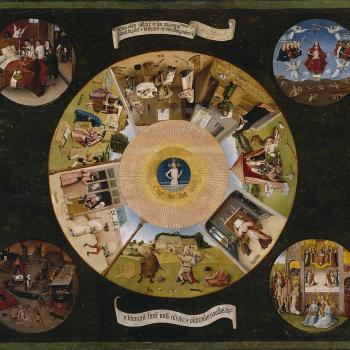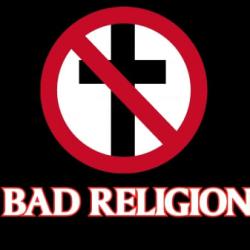Wotan chases after Brünnhilde. Illustration to Richard Wagner’s opera, Das Rheingold (1910), by Arthur Rackham (1867-1939) [public domain / Wikimedia Commons]
* * *
I wrote the following remarks on an enormously popular atheist thread: Jesus never existed. Words of atheist TheMarsCydonia will be in blue.
* * * * *
This [denial of Jesus’ historical existence] is a ridiculous position; intellectual suicide; held by virtually no scholars who would be in a position to know. I never bother arguing it with anyone (just as I don’t waste time on equally silly geocentrist or flat-earth arguments), but I have collected many refutations of the position from scholars.
[second section: “Jesus: Historical Support”]
It was obviously a timely thing to collect these resources, so I could give the thousands who eat up this nonsense the “other side of the coin” (should they be open-minded enough to examine it).
Since you have argued a number of times that the difference between a reasonable position and an irrational position is the number of “serious thinkers” that adhere to it, could you answer the question I previously asked but to which you were too busy to respond other than with a “I’m too busy to respond”:
How many “serious thinkers” does it take for a position to go from irrational to reasonable?
Technically, it requires none, as a thing can be true that is held by one person in the world, or even none. This can quickly descend to the genetic fallacy or ad populum fallacy.
But numbers of scholars, etc. believing something is not utterly irrelevant as a consideration. I wish, for example, that I had a dollar for every time I have heard an atheist argue that “All scientists believe in evolution.” They obviously think that this is some sort of ace-in-the-hole against the creationist (and I am not an anti-evolutionist; I’m a critic of scientific materialism and attempted exclusion of God altogether).
That said, when we come to this subject, it is relevant to note that virtually all historians casually accept the fact of the historical Jesus. Many of those, of course, would or could deny that He claimed to be God or was God, which enters the realm of theology (though the claims themselves are a matter of historiographical research). But they believe He existed. Therefore, for folks to come around and deny it is rather an uphill climb, to put it mildly. The overwhelming evidence (even if we only look at completely “non-religious” opinions of historians, archaeologists and other academics), lies with His existence.
I’ve also appealed to scholars (particularly historical philosophers) pertaining to the question of God’s existence, as you know. That was specifically in reply to the common atheist (ludicrous, asinine) charge that belief in God is no different in kind from belief in Santa Claus, the Easter Bunny, the tooth fairy, leprechauns, unicorns, the man in the moon, Peter Pan (did I leave any of the favorites out?).
So when asked, “what’s the difference?” I appealed to the obvious fact that there is a huge body of literature in philosophy (again, not even counting religious thought) whereby many extremely intelligent people have argued within philosophy that the existence of God is quite plausible, and the best interpretation of reality.
There is no such body of literature for Santa Claus, the Easter Bunny, the tooth fairy, leprechauns, unicorns, the man in the moon, and Peter Pan. And that is a huge difference that cannot, I think, be blithely dismissed or itself ridiculed.
But let’s be clear: I’m not arguing that “x is true because large numbers of smart people believe it.” Baldly stated like that, this would be the ad populum fallacy and not persuasive to anyone familiar with classical logic.
I’m saying something different:
“If something is believed by a large number of scholars and academics: now and throughout history, it ought not be derisively dismissed as on the level of leprechauns or the tooth fairy. It should be accorded a certain level of respect.”
And/or, another variant:
“Scholars and academics by the multiple thousands ought not be immediately dismissed as idiots and simpletons merely because they believe in something (God / Jesus’ existence) that is disparaged by atheists.”
Now, elsewhere in this thread you have mocked my positions as follows:
“‘Unanimous’ does not always have the same value depending on the subject. Take Mr. Armstrong on these subjects for example:
“Historicity of Jesus: near unanimous consensus is valid and thus it is irrational to think otherwise.
“Climate change: near unanimous consensus is invalid and …
“I’ll let you fill in the blank.”
Since my position is much more so that a position (generally speaking) ought to be taken seriously if many academics / scholars hold it, rather than automatically be assumed to be true (ad populum fallacy or obsession with “head counts”), the climate change thing can easily be explained.
I don’t say that the currently fashionable climate change thing is ridiculous, on the level of believing in the tooth fairy, etc. (as atheists say of theism). I say it is simply misguided and wrong.
I also interpret it within larger science, and the history of science. Many non-climatologist scientists are skeptical of it, and a significant minority within climatology also is. This is nothing unusual in the history of science, as I have argued elsewhere. If one reads the classic, Structure of Scientific Revolutions by Thomas Kuhn, or the late great writer / paleontologist Stephen Jay Gould‘s excellent articles and books on the history of science, it is observed that there are paradigm shifts, in which the new paradigm gaining ascendancy may have a small minority of adherents at first.
Examples would be Copernican heliocentrism or relativity or Big Bang cosmology (the first and third having been initiated by Catholic scientists: one even a priest). Others are quantum mechanics and plate tectonics (which only came to fruition in the 1960s). The present one is string theory in physics. All would have started out “small” but that was no disproof of their truthfulness (or possible truthfulness, in the case of string theory).
When Einstein brilliantly conceived the theory of relativity in his head, he may quite possibly have been the only person in the world (or even the history of the world) who believed in such a thing. Yet it appears to be a true description of external reality, and was later verified by empirical observation.
Gould wrote about Raymond Dart, discoverer and early advocate of Australopithecus. He was treated like crap because the consensus among evolutionists for much of his life was towards larger skulls, with regard to human evolution. Thus, science at large was taken in by the farcical fake Piltdown Man for over 40 years, precisely because it had a large skull, and that was the fashionable belief.
Gould himself: one of the originators of punctuated equilibrium, had to fight against the overwhelming consensus of Neo-Darwinian gradualism in science, and contended that an all-encompassing gradualism was never “read in the rocks.”
Those would be some examples of how science proceeds. So yes, I am perfectly justified in being skeptical of global warming fanaticism, as presently fashionable. There have been plenty of precedents before in the history of science. Scientists are fallible human beings with bias and capable of great folly and foibles, just like anyone else.
When Galileo and Kepler were revolutionizing astronomy and cosmology, they were neck-deep in astrology (while Augustine and Aquinas had long since rejected it). Isaac Newton was an alchemist. Etc., etc.
Thus, in the end (bottom line / final analysis), any and every argument must be considered on its own merits. This should be obvious to any thinker.
All of the above is perfectly consistent, rightly understood. But atheists so rarely understand serious theistic thought, which is a huge problem. Half the time, they deny that we theists ever have a serious thought running through our brains. And so we can hardly bridge that gap and talk to each other. Prejudices run too deep (on both sides).


















